Author Archives: Rishe Groner
December 18, 2017 by Rishe Groner
Hanukkah: Fiery Feminist Holiday or Women’s Consolation Prize?
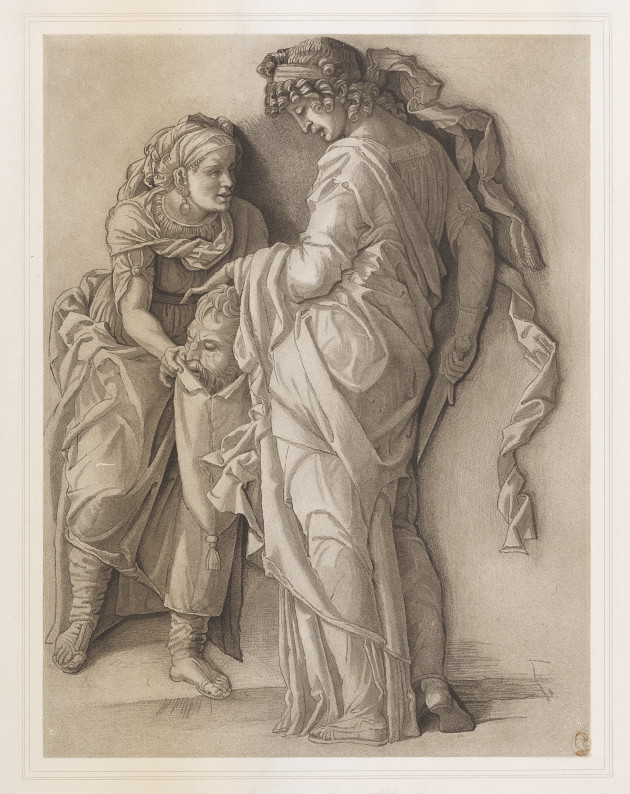
Print, “Judith with the Head of Holofernes,” 19th century, unknown artist.
Since I was raised as a child in an Orthodox community, Hanukkah was the closest thing I had to a feminist holiday.
I grew up in Australia, where I celebrated Hanukkah at summer camp with a menorah lighting that rivalled Shabbat for its beauty and community. We sang “Hanerot Hallalu” with the traditional Hasidic melody and danced around the dining room with our arms around each other. We played variations of dreidel throughout the festival and doughnuts were currency in the camp black market.
One of the ways we learned of the story of Hanukkah was through children’s story tapes. Along with catchy tunes about spinning dreidels and lighting the candles from left to right, it featured the type of song that was rare in my diet of traditionally Orthodox Jewish children’s media—a homage to women, and their contribution to the Hanukkah story.
- 1 Comment
December 1, 2017 by Rishe Groner
Why We Still Haven’t Truly Heard Dinah’s Story—And Never Can
We’d been steadily progressing through the Chumash in school since the first grade. We’d covered the stories of the patriarchs and matriarchs, Abraham and Sarah and Isaac and Rivkah and now, in fourth grade, we were in the thick of Jacob’s ever-expanding family of tribes. He’d spent 21 years working for the privilege of marrying his two wives, sisters Rachel and Leah, and had just met up with—and reconciled with—his estranged twin brother.
Then our teacher invited us to close our books for this lesson.
“I’m going to tell you a story,” she said to our all girls class “And in the meantime, you can draw pictures.”
And so I heard the story, the one we sometimes criticize our teachers for skipping, of the abduction and rape of Dinah, daughter of Jacob. I scoffed in later years at the sanitization of Jewish memory, at that decision to take one of the most troubling, disturbing and triggering stories of the Bible and sterilize it for our nine-year-old ears. It’s only now, decades later as I dig into my feelings around this story, that I recognize with some gratitude the wisdom of hearing about this rape through the ancient feminine modes of storytelling and discussion.
When I continued my studies, I found that the midrash provides layers of context – some informative, some challenging, some seriously disturbing. In Anita Diamant’s acclaimed The Red Tent, Dinah grows into a maiden with personality beyond the rabbis’ broad strokes. And yet, I sometimes regret that additional knowledge has colored my perspectives, and wonder how I personally would have perceived this story without the interpretations of others, as my teacher asked me to on that day two decades ago.
- No Comments
October 18, 2017 by Rishe Groner
#MeToo: The Shechinah Is Crying
I said Me Too, and so did a lot of women. And it’s an important conversation. And I want more than men to stop raping people. Or really, people to stop raping people.
I want men to stop talking over me in conversation. To ask me for my opinion, actually, instead of assuming they know more than me on a given topic. Especially if it’s an expertise of mine.
For that matter, I want to be able to offer myself as an expert in a conversation without being questioned, invalidated, wondered about.
- No Comments
September 28, 2017 by Rishe Groner
A Feminist Prayer for Yom Kippur
On this Yom Kippur day
I pray
I ask for forgiveness
Please forgive me
Divine Mother
Shechinah
Spirit of the Universe
Cosmic Creator
Forgive me
For not recognizing the body You’ve given me as Divine
for disrespecting the earth that is Your body
Strewing it with styrofoam and plastic trash
As I’ve strewn my own body with self-loathing, judgment,
Dear Goddess
Please forgive me
For not embodying You
And behaving with compassion
Communicating with my heart
Instead of my head
To the Supernal Divine
Infinite Mystery
That fills the universe
Forgive my errors in judgment
Of harshness and rashness
As I’ve failed to recognize
That I too am divine
As are You
And You are within me
Forgive us
As a society
For telling boys to man up
For criticizing women who are too needy
And boys who are too emotional
For calling that girl a slut
For telling that woman to shut up
For competing with her in the workplace
For failing to articulate my own needs
For neglecting my own feelings and emotions
Or suffocating others with my need to serve them
Oh Shechinah
Feminine presence in the universe
Broken and battered
Tattered in clothing
Please forgive us
For rape culture
For gaming culture
For internalized misogyny
For corporate hierarchy
For religious patriarchy
For jealousy
For mansplaining
For homophobia
For abusing our trans siblings
For deflecting responsibility
For dieting excessively
For eating mindlessly
For trying to place a value on a body
That is already determined by You
To be divine
Forgive us
Divine Mother
and grant us all that You embody
Grant us compassion
Grant us collaboration
Grant us communication
Grant us the ability to listen
Grant us the ability to receive
Grant us the ability to feel
Grant us the opportunity to heal
Grant us the opportunity to express ourselves
Grant us the opportunity to cry, as the darkest depths move us through to the other side
- 2 Comments
September 20, 2017 by Rishe Groner
A Feminist Prayer for Rosh Hashanah—In Honor of Hannah
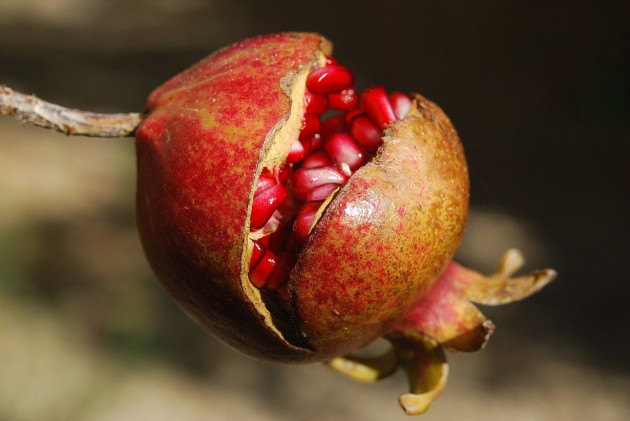
May we be blessed this Rosh Hashanah that all our prayers are answered, as Hannah’s were answered, with joy and with gratitude. May our words be heard, may our cries rise to the heavens and penetrate the skies, may they cause vibrations in the earth that shake the universe at its very core. May we all find a way to reach the heart of ourselves and connect to the Divine in our own way, and line up a year of joy, blessing, prosperity, goodness, health, abundance, magic and love to all beings.
Rishe Groner is a writer and strategist living in Brooklyn. She is the founder of TheGene-Sis.com, a post-Hasidic embodied approach to self-transformation.
The views and opinions expressed in this article are the author’s own and do not necessarily reflect those of Lilith Magazine.
- 2 Comments
August 7, 2017 by Rishe Groner
Why Tu B’Av Is Much More Than Just “Jewish Valentine’s Day”
 When I was in elementary school, our Australian Jewish private school had a strict uniform, down to accessories: only navy blue knee-high socks or tights, and navy or royal blue hair bows or scrunchies. (It was 1993). Once a year, though, I remember that my sister and I whipped out the white frou frou barrettes we’d worn at our aunt’s wedding, and donned the white knee-high socks we wore on weekends. We’d get to school and there’d be Israeli dancing in the assembly area, following the steps announced by a heavily accented teacher. It was Tu B’Av, the date on the Hebrew calendar worth remembering and celebrating zestfully. With our white clothing and our dancing, we were almost, if not quite, imitating the traditions of our ancestors.
When I was in elementary school, our Australian Jewish private school had a strict uniform, down to accessories: only navy blue knee-high socks or tights, and navy or royal blue hair bows or scrunchies. (It was 1993). Once a year, though, I remember that my sister and I whipped out the white frou frou barrettes we’d worn at our aunt’s wedding, and donned the white knee-high socks we wore on weekends. We’d get to school and there’d be Israeli dancing in the assembly area, following the steps announced by a heavily accented teacher. It was Tu B’Av, the date on the Hebrew calendar worth remembering and celebrating zestfully. With our white clothing and our dancing, we were almost, if not quite, imitating the traditions of our ancestors.
Ancestors—aka the ladies of Shiloh. The maidens of ancient Israel and Judea who each year at the grape harvest would celebrate ecstatically with dances through the vineyards and onto the wine press. As they squeezed the grapes with their bare feet, they drew the glances of young men who came to the annual festival to find their chosen wives. And with it, the most unusual mating ritual until The Bachelorette. Maidens garbed themselves in white dresses, perhaps imagining themselves as Anne Shirley’s “heroine in a white muslin dress,” looking their best for their gentlemen suitors––but with a catch. No woman wore clothing that was her own. The poorest maiden wore elaborate dresses from her rich neighbors, while the daughter of the mayor borrowed a simple shift from an acquaintance. The maidens would call out across the fields at the gentlemen spectators, shouting out their traits as if in a cattle market.
“Look not to riches, for a woman with pious deeds is worth more than rubies!” The daughter of the baker would shout.
“Worry not about the beauty of your wife, for far more important is her family and illustrious ancestors!” The daughter of the Torah scholar who did not meet conventional beauty standards might announce.
Each woman would find ways to showcase the value of her particular brand of beauty—while, the Talmud tells us, criticizing the conventional modes of beauty that might be priorities for others.
- No Comments
August 1, 2017 by Rishe Groner
How Reading the Prophets Through a Feminine Lens Illuminates Tisha B’Av
This week’s period of mourning on the Jewish calendar, and today’s day of mourning, Tisha B’Av, vary in their significance for those living in the sometimes-comfortable sometimes-challenging diaspora. Some view the holiday as an irrelevant memorial to an Ancient temple, others as a current remembrance of the roots of tragedy throughout both society in general and our ancestors and people in particular.
Lamentations is traditionally read on the Ninth of Av, and Isaiah and Jeremiah are also both read around this time in the Jewish calendar. In these texts, there is no shortage of imagery surrounding the many iterations of the weeping woman—Mother Rachel, the Mother of Zion, and the daughter of Zion. She is wearing tattered clothing. She is abandoned as a whoring woman by her fickle lovers. She is weeping as her children starve and lick the dust. She is primal in her crazed pursuit of survival. She is destroyed as she wails on a mountaintop, a black-clad banshee.
The divine mother is not a frequent image in modern day Judaism, and the divine daughter even less so. But it’s in this space of deep exile surrounding Tisha B’Av, when the people have lost all hope and identity, that we see her imagery ring out.
- No Comments
June 20, 2017 by Rishe Groner
Embodying the Shabbos Queen
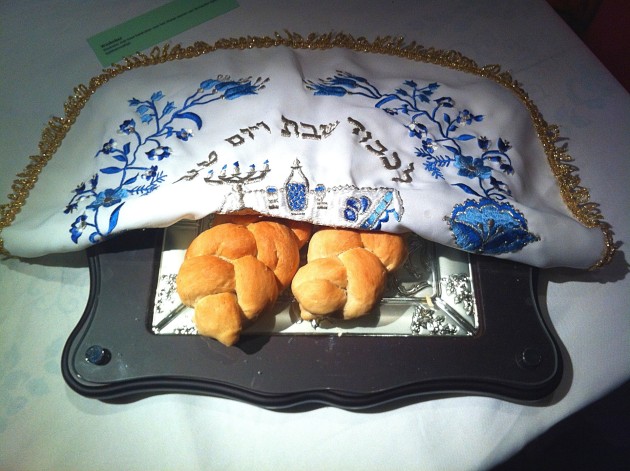
As a little girl, from the age of three, every Friday evening I stood at my mother’s side and would hold her wrist as we lit candles together, waving our arms and circling them three times before reciting the blessing over the Shabbat candles, eyes covered as we silently recited prayers for ourselves, our family, and the entire world. When I would remove my hands from my face, the room would look different. The shabby carpeting a little more lush, the smudged walls more pristine, the tablecloth blindingly white, and the faces of my mother and sister shining like angels.
I’d learned in preschool that this was because of the arrival of the Shabbos queen, the mythical figure that signified the entrance of the Divine presence into our daily lives and the shift from the weekday mundane into Shabbos mode.
- No Comments
May 30, 2017 by Rishe Groner
What We Learn From Ruth: The Brazenness of Vulnerability
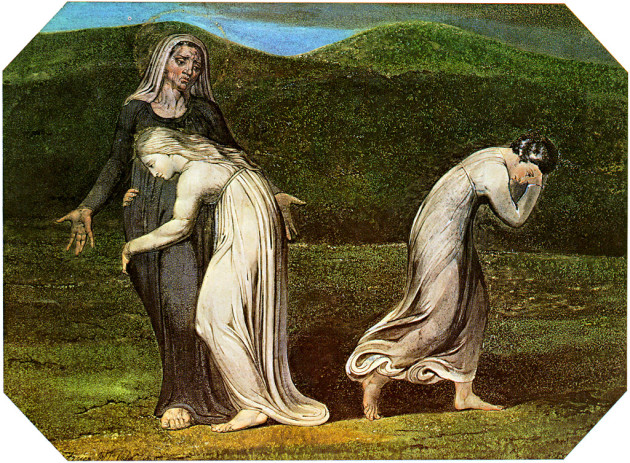
A 1795 William Blake painting of Naomi asking Ruth and Orpah to go back to Moab.
Judaism has no shortage of feminist heroines—it’s what we learn from them specifically that’s often puzzling to the modern day feminist. We struggle to map our knowledge of present day concerns for the everyday woman against ancient mores while witnessing the inherent strengths in those who bucked the trend.
One such figure is Ruth, a woman I’ve always puzzled over, for her wants and needs are no mystery—but to any of us raised within Judaism, they seem awkward and bizarre. Why would a Moabite princess, privileged and pampered in her position, choose to follow an Israelite widow back to a ravaged land of famine? Why would a woman choose to leave behind the only life she’s ever known to learn at the feet of an old, wise woman? It seems contrary to most of what we learn from society, really.
And it’s not normal, that’s clear. Even Naomi, the Jewish mother-in-law of Ruth, recognizes the societal trend being ignored by her devoted daughter-in-law. Though Ruth’s husband—the son of Naomi—is gone, and Naomi bids her daughter-in-law adieu with a wish to find another husband and bear children, she refuses. She chooses to follow Naomi: for your people are my people, your land is my land, your God is my God.
- No Comments
April 7, 2017 by Rishe Groner
Why the Miriam Story Stops
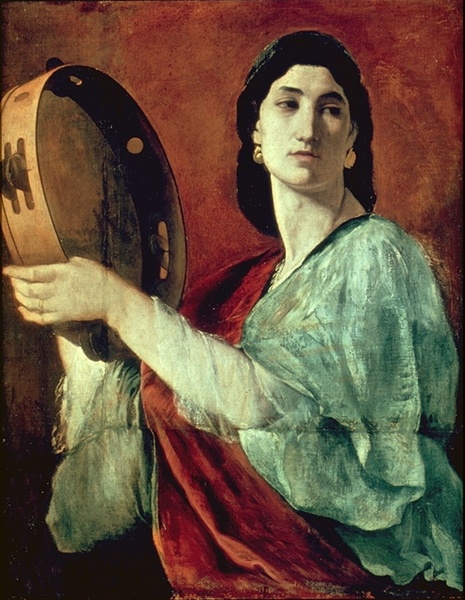 Miriam the prophetess has been an acclaimed character in Jewish feminist lore for years, but I wasn’t raised among feminists, and so when we talked about Passover, Moses was our hero and Miriam a loyal sidekick.
Miriam the prophetess has been an acclaimed character in Jewish feminist lore for years, but I wasn’t raised among feminists, and so when we talked about Passover, Moses was our hero and Miriam a loyal sidekick.
Moses found the burning bush, transformed his staff into a snake, and split the Red Sea. We heard of little Miriam early on. She chastised her parents for separating to prevent their future children suffering the same fate, indignantly calling them out on their preventing even girl babies from being born, when Pharoah had outlawed only baby boys. When her brother Moses was born, she peeked between the reeds at the Nile riverbank, watching as he floated down the river in a basket to be adopted by the Egyptian princess; Miriam then recommended her own (and Moses’s) mother as a Hebrew wet-nurse, according to commentators.
But it’s there that Miriam’s story stops.
She’s not visible when Moses and the third sibling, Aaron, spend their time negotiating with Pharoah for the Israelites’ freedom, and when the plagues take over Egypt, she’s not present. Miriam rises only later, as the Hebrews cross the Red Sea, as the woman who takes her timbrel in hand and leads the women in a dance with songs of praise, celebrating freedom and taking her place as heroic leader throughout the ensuring 40 years’ desert wandering. In fact, Miriam’s magical well sustains the people with water in the wilderness, and the entire nation mourns her death.
- No Comments
 Please wait...
Please wait...